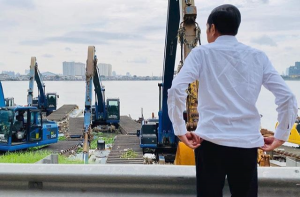If 2019 was the Year of Living Excitedly, with the world’s biggest-ever one-day polls returning President Joko “Jokowi” Widodo to his post, 2020 will be the Year of Quietly Getting on With It. After securing a broad mandate, the government has virtually a clear path to institute reforms and launch its ambitious plan to move the seat of government to Kalimantan. Still, external pressures will always have to be navigated, as seen at the start of the year near the Natuna Islands.
The Business of Work
Reforms to the labor laws had been tipped by the president during his first term. The law as it currently stands, the government argued, was suited to the immediate post-Suharto days and went far in creating employment and closing the poverty gap. But, it’s no longer the last 1990s and Indonesia’s economy has changed dramatically. An omnibus of reforms targeting 79 existing laws will be tabled this week in an effort to boost foreign investment and diversify local industries.
Indonesia has consistently underperformed in the ease of doing business index compared to regional neighbors, but slow efforts in recent years will get a huge boost if reforms go to plan. Visa requirements in key sectors are expected to be made easier while entry barriers to the massive energy sector will be relaxed. An update to the negative list, a list of sectors in which foreign involvement is barred, will see reforms with a focus on industries which have the potential for mass employment.
Much of these slated reforms are in line with previous comments and commitments made by President Jokowi in his first term. Last October, economic data from across the region showed Indonesia trailing Vietnam leading the regional bounty amid the U.S.-China trade war. Indonesia failed to pick up much in the way of firms shifting manufacturing out of China, a point that angered the president and renewed his zeal for reform.
Others are less enthused for the near-inevitable change. Unions and other labor groups have been pushing back against reform — particularly focusing on scrapping of benefits and severance pay-outs. Thousands of workers and supporters rallied against the reforms outside the parliamentary complex in Jakarta earlier this week, indicating likely future showdowns as the bill moves through legislative stages. The government controls the People’s Representative Council (DPR) handily but could face push-back from members.
Officials also warn that hoax versions of the draft are circulating online. The Office of the Coordinating Economic Minister earlier this week released a statement reassuring the community that a final draft has not yet been submitted to the parliament and purported bills doing the rounds online, particularly via WhatsApp, are falsified.
Moving Along on Capital Construction
Indonesia’s administrative workers are still years off moving to new office spaces in Kalimantan, but this year will set the foundations for the planned construction. While President Jokowi’s announcement had been met with a fair share of skepticism — he certainly isn’t the first president to suggest a move — 2020 is set to be the year of movement on the issue.
Parliament will have to formally agree to move the capital, but that seems a mere formality with recent developments. Abu Dhabi Crown Prince Mohammed Bin Zayed Al Nahyan, who visited President Jokowi in Jakarta earlier this month, has agreed to head a Steering Committee which would advise the government and reassure foreign investors. He’ll be joined by Softbank’s Masayoshi Son, who has previously said he wanted to work on Smart and Green City initiatives, and former UK prime minister Tony Blair.
Still, with costs estimated between $33 and $40 billion securing funding is set to become its own issue this year. Private firms, like Son’s Softbank, have indicated interest as well as China, which will no doubt spark fierce debate.
The Jakarta government will spend much of this year formulating a path ahead. While it will lose its place as capital city, as the hub of economic activity Jakarta will maintain special status in another form. Jakarta Governor Anies Baswedan and his government have this month begun drafting a replacement for the 2007 capital city law which it expects to focus on supporting emerging sectors, including tech and creative industries.
A Showdown Draws a Line
The arrival of Chinese fishing vessels in Indonesia’s share of the South China Sea in December was not the showdown it could have been. Instead, it was peacefully resolved with Indonesia emphasizing sovereignty and recognized international law. The deployment of the military and the presence of the president himself eventually saw China’s Coast Guard escort the vessels out of the waters.
Compared to other ASEAN members, Indonesia had been fairly quiet on the South China Sea after the 2016 flare-up. Its response to the incident at the very start of the year shows off a fiercely assertive foreign policy which could reverberate across the region. Already, analysts in the Philippines have wondered aloud if perhaps the Indonesian response is something which could be replicated by Filipino authorities in the future.
What exactly this means for Indonesia’s broader approach to maritime security and the South China Sea, however, remains unclear. As with the other domestic political issues mentioned previously, 2020 could prove to be a defining year in terms of determining whether we will see more progress on much-needed reforms under Jokowi or more statis and stagnation.

































